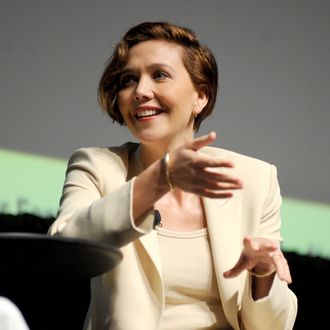
On Saturday, Elena Ferrante announced in an essay in The Guardian that Maggie Gyllenhaal is adapting her novel The Lost Daughter for film. The story follows a middle-aged, divorced mother on a seaside vacation who explores how she raised her now-adult daughters. The film will be Gyllenhaal’s directorial debut. Later on Saturday, Gyllenhaal spoke at the New Yorker Festival about how the adaptation is coming along and why she wanted to start directing.
“I never felt interested in directing, or like I could direct,” she explained. “I feel like something about the climate right now. I feel like what’s happening in the world right now has shifted my thinking about whether or not I can direct or can begin to think about directing.”
So, right before Gyllenhaal turned 40, she wrote a letter to Ferrante. “Last November, I spent a few weeks writing this letter to Elena Ferrante. I said what I wanted to say to her about how I would imagine The Last Daughter,” said Gyllenhaal. “She came back and said, You can have the rights, but you have to direct it. I’m only giving the rights to you to direct.” Gyllenhaal said she would, but a few months later she questioned if she could still make the film if she were the director. “I was like, Well, I mean, I don’t know. What if we can’t finance it with me directing it? And what if something happens? And she said, No, I only — It makes me want to cry actually, because it’s like the woman who I admire basically saying you can do it. And who better than her?”
But Gyllenhaal still has a long way to go. She’s currently two-thirds of the way through the adaptation, which will take not take place in Italy like the novel. She has a draft due in mid-November, which she’ll go over with the producers in Naples, then will start casting. Gyllenhaal said she has no intention of acting in the film, though. “I think that’s too much for me,” she said. “But I’m fascinated, I have to say, to work with an incredible actress. I have so much experience being directed and what feels good to me and what doesn’t. I’m so interested to observe someone and support someone going through something difficult.”
For Gyllenhaal, reading Ferrante was always a special experience. “I was like, Whoa, this is going in pure,” she said. “I have never heard these things articulated before. There was one point where I was like, This woman is so fucked up, and then I was like, I totally relate to her. In Days of Abandonment, I dropped that book and couldn’t pick it up for a couple days.”
In The Guardian, Ferrante wrote that The Lost Daughter is Gyllenhaal’s to tell now. “It’s important for me — for her, for all women — that her work be hers and turn out well. Mine already exists, with its strengths and defects.” She continued, “Women have to contribute to an artistic genealogy of our own that stands up — in terms of intelligence, refinement, skill, richness of invention, emotional density — to the male tradition.”




